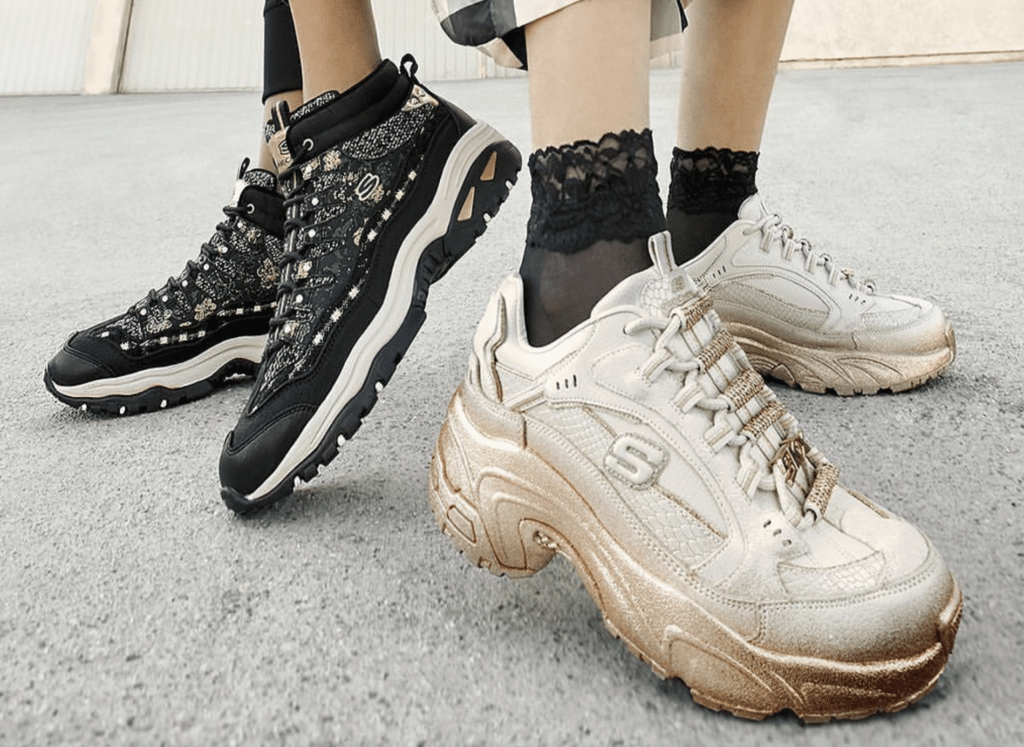Skechers has waged a new lawsuit against footwear brand STQ Global, Inc., accusing the footwear company and its owner of engaging in both trademark and patent infringement, as well as counterfeiting and trademark dilution, thanks to its manufacture and sale of copycat sneakers. According to the newly-initiated case, which was filed in the U.S. District Court for the District of Colorado, on November 6, Skechers claims that STQ Global and a handful of associated parties, including its China-headquartered parent company, (the “defendants”) intentionally copied its “S” trademarks in order “to mislead buyers and capitalize on the brand’s reputation.”
Skechers alleges that the defendants replicated its “S” trademarks on their own sneakers and co-opted patent-protected elements of its sneakers, including the design of the upper and outsole of its Slip-In model. According to Skechers’ suit, “the similarities between the defendants’ products and Skechers’ Slip-Ins are so striking that they create a likelihood of consumer confusion and falsely suggest an affiliation with Skechers.”

Trademark Claims: On the trademark front, Skechers maintains that the defendants have made use of marks that mimic its various “S” marks, thereby, infringing those distinctive trademarks that Skechers says that it has used for decades and are widely recognized by consumers. At the same time, Skechers accuses the defendants of counterfeiting as a result of their use of the “S” logos that are “indistinguishable from Skechers’ registered marks.”
Skechers outlines several tactics employed by the defendants to foster consumer confusion and capitalize on Skechers’ brand recognition. These include the defendants’ practice of “purchasing keywords related to Skechers’ products on major e-commerce platforms, such as Amazon and Walmart,” resulting in searches for “Skechers Slip-Ins” often displaying the defendants’ products. This strategy, according to Skechers, “misleads consumers into believing they are purchasing genuine Skechers shoes.”

The defendants also reportedly used product names like “Slip ins” and rotated product images to enhance the visual similarity to Skechers’ designs. Verified customer reviews cited in the complaint highlight instances of consumers expressing confusion and disappointment after purchasing imitation products they believed to be from Skechers. The complaint states, “Indeed, on numerous occasions, the defendants’ conduct and use of Skechers’ marks has caused actual confusion, with customers expressing disappointment in having been misled into buying imitation products. By way of example, many such customers have left verified reviews of the defendants’ trademark infringing shoes on Amazon.com, confusing them with Skechers’ shoes.”
Not limited to trademark infringement and counterfeiting claims, Skechers also argues that the defendants’ unauthorized use of lookalike marks “dilutes the unique association that these marks have with Skechers’ brand.”
Patent Infringement: In terms of its patent claims, Skechers contends that the defendants have infringed a trio of its design patents, which protect the ornamental designs of its Slip-Ins shoes. The California-based footwear-maker states that the defendants’ products, particularly the “Ease in” shoes, “embody these designs to such an extent that they deceive an ordinary observer.” Additionally, Skechers accuses the defendants of infringing one of its utility patents, which relates to technology enabling hands-free shoe entry and removal – a key feature of its Slip-Ins line.
With the foregoing in mind, Skechers is seeking injunctive relief to stop the defendants from further manufacturing, marketing, and selling the allegedly infringing products. It also demands monetary damages for lost profits, actual damages, enhanced damages due to willful infringement, and reimbursement for legal fees. Skechers is requesting treble damages as a deterrent against future violations and seeks a declaratory judgment to invalidate and cancel any conflicting trademark registrations held by the defendants.
THE BIGGER PICTURE: The broader implications of Skechers’ lawsuit highlight a trend in global commerce, namely, the emergence of brands originating from China that are competing directly with established Western companies – and allegedly engaging in infringement in the process. The rise in Chinese brands operating in Western markets comes as platforms, such as Amazon, Walmart, and Temu, among other major online retailers, have made it easier than ever for new brands to enter international markets and bypass traditional barriers to entry.
In conjunction with the emergence of Chinese brands on platforms like Amazon, there has been a spike in disputes over the products at play. For instance, there has been a notable increase in intellectual property disputes involving Chinese sellers on Amazon, according to MIT Technology Review, which reported that “in the last few years, many sellers have been slapped with massive lawsuits for intellectual property infringement.” The outlet stated that “the total number of such cases has grown over 500 percent in half a decade.”
Meanwhile, a report by Amazon Sellers highlighted how sellers in “Chinese cities lead the Amazon seller network, surpassing U.S. hubs,” reflecting the global shift in e-commerce dynamics.
Unlike previous decades, where Chinese companies primarily acted as manufacturers for Western brands, a growing number are now building their own brand identities and launching them directly to consumers worldwide. The accessibility of platforms like Amazon allows these companies to market products and scale quickly without the need for physical storefronts. However, GBC Law notes that this ease of market entry has resulted in an increase in counterfeits,” creating “IP violations on platforms like Amazon, eBay, Temu, Alibaba and others, [which] have become a significant problem for brands of all sizes.”
For companies like Skechers, this shift in the market presents both opportunities and challenges. While the expansion of e-commerce fosters competition and innovation, it also requires strident enforcement for trademark and patent holders as new brands, including those based in China, leverage global platforms to reach consumers and potentially engage in infringement at the same time.
The case is Skechers U.S.A., Inc. v. STQ Global, Inc., 1:23-cv-02216 (D. Colo.).














